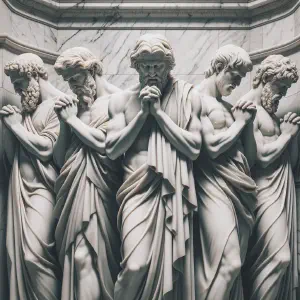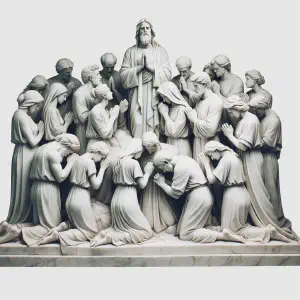The Faithful in Exile
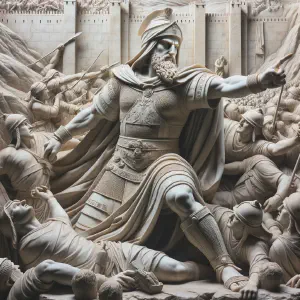
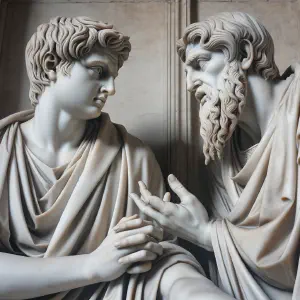
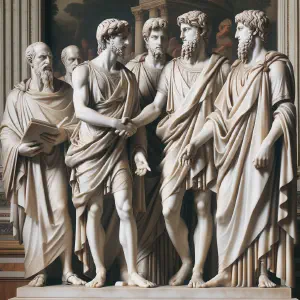
Meanwhile, in the Gospel, Jesus observed the offerings of the wealthy and a poor widow at the temple. He highlighted the widow’s offering as greater, for while the wealthy gave from their surplus, she, in her poverty, gave all she had to live on. This act, paralleling the faith and integrity of Daniel and his companions, serves as a testament to true devotion and trust in God. Both stories, from different times and contexts, underscore the value of sincere faith and the impact of humble offerings in the eyes of the Divine.
Five Questions
What is the significance of Daniel and his friends being chosen by King Nebuchadnezzar?
King Nebuchadnezzar’s selection of Daniel and his friends reflects a common practice of ancient empires to assimilate the elite of conquered peoples. By choosing young men of royal or noble lineage, the king aimed to educate them in the ways of the Babylonians, thus securing loyalty and integrating them into his administration. Daniel and his friends represented the best of Judah, and their selection underscores the cultural and intellectual exchange that often accompanied such conquests.
Why did Daniel refuse to eat the king’s food, and what does this tell us about his character?
Daniel’s refusal to eat the king’s food was an act of faith and adherence to Jewish dietary laws. This decision reveals his unwavering commitment to his religious principles, even in the face of potential danger or disadvantage. It shows that Daniel prioritized his spiritual integrity over the comfort and luxury of the royal provisions, demonstrating a deep-rooted devotion and trust in God.
How do the results of the ten-day test Daniel proposed reflect on God’s providence?
The results of the ten-day test, where Daniel and his friends appeared healthier after consuming only vegetables and water, can be seen as a direct manifestation of God’s providence. It suggests that God rewards those who remain faithful and steadfast in their beliefs, even in challenging circumstances. This event also serves to validate Daniel’s faith and influences the Babylonian official to respect and support their dietary choice.
How does the story of the poor widow in the Gospel relate to the narrative of Daniel and his friends?
The story of the poor widow, who gives two small coins, which is all she has, parallels the narrative of Daniel and his friends in their display of unwavering faith and devotion. Just as Daniel and his friends chose faithfulness over comfort, the widow’s offering, though small, represented her total reliance on and trust in God. Both stories highlight the theme that true devotion and faith are not measured by outward appearances or material wealth but by the sincerity and integrity of one’s heart.
What broader message do these scriptures convey about faith and service to God?
These scriptures collectively convey that true faith and service to God are about integrity, trust, and commitment, often in the face of adversity or challenge. They teach that devotion to God is not just about following rituals but involves sincere and sometimes sacrificial actions, reflecting a deep trust in God’s plan. The narratives encourage believers to remain steadfast in their faith, illustrating that God’s providence and blessings follow those who are loyal and true to their spiritual convictions.
Bible Study
Daniel 1:1-6, 8-20
In the third year of the reign of Jehoiakim, king of Judah,
King Nebuchadnezzar of Babylon came
and laid siege to Jerusalem.
The Lord handed over to him Jehoiakim, king of Judah,
and some of the vessels of the temple of God;
he carried them off to the land of Shinar,
and placed the vessels in the temple treasury of his god.
The king told Ashpenaz, his chief chamberlain,
to bring in some of the children of Israel of royal blood
and of the nobility, young men without any defect,
handsome, intelligent and wise,
quick to learn, and prudent in judgment,
such as could take their place in the king’s palace;
they were to be taught the language and literature of the Chaldeans;
after three years’ training they were to enter the king’s service.
The king allotted them a daily portion of food and wine
from the royal table.
Among these were men of Judah: Daniel, Hananiah,
Mishael, and Azariah.
But Daniel was resolved not to defile himself
with the king’s food or wine;
so he begged the chief chamberlain to spare him this defilement.
Though God had given Daniel the favor and sympathy
of the chief chamberlain, he nevertheless said to Daniel,
“I am afraid of my lord the king;
it is he who allotted your food and drink.
If he sees that you look wretched
by comparison with the other young men of your age,
you will endanger my life with the king.”
Then Daniel said to the steward whom the chief chamberlain
had put in charge of Daniel, Hananiah,
Mishael, and Azariah,
“Please test your servants for ten days.
Give us vegetables to eat and water to drink.
Then see how we look in comparison with the other young men
who eat from the royal table,
and treat your servants according to what you see.”
He acceded to this request, and tested them for ten days;
after ten days they looked healthier and better fed
than any of the young men who ate from the royal table.
So the steward continued to take away
the food and wine they were to receive, and gave them vegetables.
To these four young men God gave knowledge and proficiency
in all literature and science,
and to Daniel the understanding of all visions and dreams.
At the end of the time the king had specified for their preparation,
the chief chamberlain brought them before Nebuchadnezzar.
When the king had spoken with all of them,
none was found equal to Daniel, Hananiah,
Mishael, and Azariah;
and so they entered the king’s service.
In any question of wisdom or prudence which the king put to them,
he found them ten times better
than all the magicians and enchanters in his kingdom.
In this passage, King Nebuchadnezzar of Babylon conquers Jerusalem and takes noble Jewish youths, including Daniel, Hananiah, Mishael, and Azariah, to serve in his palace. Daniel’s resolve not to defile himself with the royal food aligns with Catholic values of purity and obedience to God’s laws. His reliance on vegetables and water, and the subsequent divine blessing of health, exemplify the value of temperance and trust in God. This narrative echoes the Catholic teaching of Divine Providence and the importance of adhering to one’s faith, even in adversity.
Daniel 3:52-56
R. (52b) Glory and praise for ever!
“Blessed are you, O Lord, the God of our fathers,
praiseworthy and exalted above all forever;
And blessed is your holy and glorious name,
praiseworthy and exalted above all for all ages.”
R. Glory and praise for ever!
“Blessed are you in the temple of your holy glory,
praiseworthy and glorious above all forever.”
R. Glory and praise for ever!
“Blessed are you on the throne of your Kingdom,
praiseworthy and exalted above all forever.”
R. Glory and praise for ever!
“Blessed are you who look into the depths
from your throne upon the cherubim,
praiseworthy and exalted above all forever.”
R. Glory and praise for ever!
“Blessed are you in the firmament of heaven,
praiseworthy and glorious forever.”
R. Glory and praise for ever!
This passage is a song of praise, highlighting God’s glory and majesty. It reflects Catholic teachings on the reverence of God and the importance of worship. Each verse praises a different aspect of God’s presence and works, from His creation to His throne in heaven. The repetition of “praiseworthy and exalted above all forever” underscores the Catholic value of adoration and the eternal nature of God. The passage aligns with Catholic teachings on the worship of God alone and the acts of mercy, especially those related to adoring God and giving Him thanks.
Luke 21:1-4
When Jesus looked up he saw some wealthy people
putting their offerings into the treasury
and he noticed a poor widow putting in two small coins.
He said, “I tell you truly,
this poor widow put in more than all the rest;
for those others have all made offerings from their surplus wealth,
but she, from her poverty, has offered her whole livelihood.”
In this Gospel passage, Jesus observes a poor widow offering two small coins, contrasting her contribution with that of the wealthy. This narrative underscores the Catholic teachings on charity, sacrifice, and the true value of giving. The widow, in her poverty, gives all she has, embodying the Catholic principle of total self-giving and trust in God. This act aligns with the Catholic understanding of grace, as her gift, though small, is magnified by her faith and sacrifice. The passage teaches about the virtues of humility, generosity, and the preferential option for the poor, reflecting the Beatitudes and Jesus’ teachings on authentic discipleship.
Lessons
The readings teach us the importance of unwavering faith and integrity in challenging circumstances. Daniel and his companions, despite being in exile, remain steadfast in their devotion to God, choosing a humble diet over the royal fare to maintain their purity. This act of faith and sacrifice is mirrored in the Gospel, where the poor widow’s offering, though small, is deemed greater than the wealthier donations due to her complete trust and reliance on God. These narratives encourage us to hold fast to our faith, especially in times of trial, and to understand that true devotion is measured not by the magnitude of our offerings, but by the sincerity and integrity of our hearts.
Meditation Prayer
